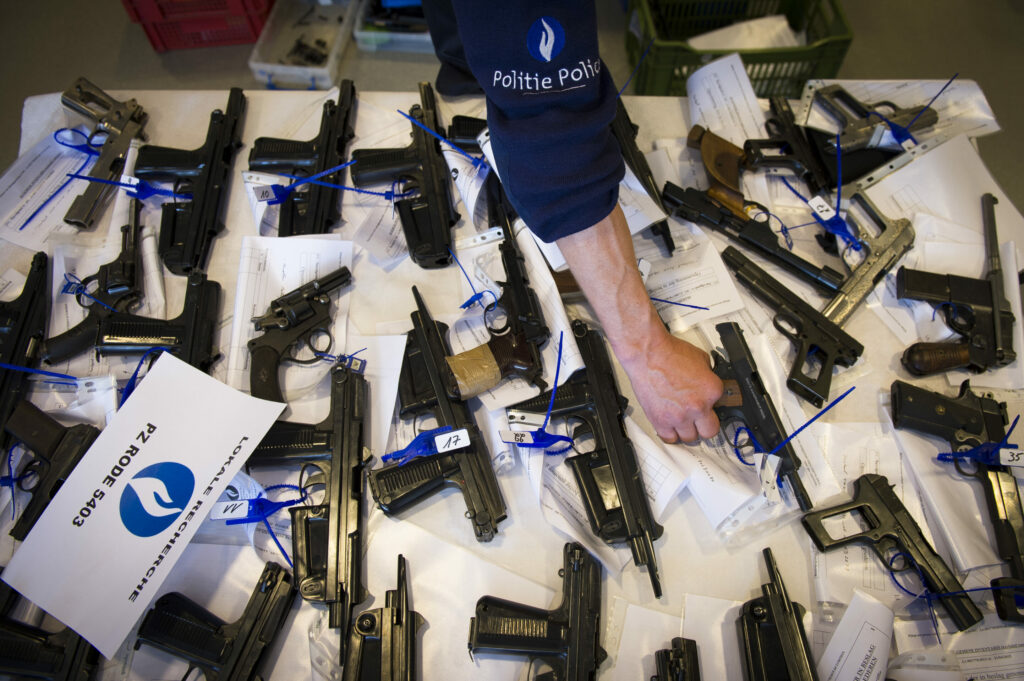A drastic increase in the illegal arms trade is looming over Belgium in the coming decades, as weapons have become easier to attain and drug gangs are increasing demand.
In 2021, the first comprehensive study on gun violence in Europe showed an increase in armed clashes between drug criminals and highlighted that firearms had become more available on the black market. Experts at the Flemish Peace Institute (VVI) warned this would likely lead to increased gun violence, intensifying 'general sentiments of insecurity among the population'.
Three years later, these predictions are ringing true, as gun violence remains rife in the country. In recent days, several shootings have shaken up the Brussels-Capital Region in what is believed to be a feud over gang territories. A report at the end of last year showed Belgium has one of the highest rates of gun violence in Europe. This is linked mainly to gang violence, and drug trafficking as the country increasingly finds itself at the heart of this criminal landscape.
On Tuesday, the Flemish Peace Institute warned that this is leading to a deadly, vicious circle: the increased drug trade is fuelling more shootings, resulting in more dealers also arming themselves. "That in turn leads to more shootings, a higher demand for weapons and thus more arms traffic and illegal arms trafficking," director of the VVI and weapons expert Nils Duquet told Belga News Agency.
Wide range of choice
The high demand is driving the illegal weapons market, even resulting in a changing clientele. Where once only major drug gangs were able to purchase weapons, nowadays smaller gangs and younger, petty criminals have relatively easy access to converted or reactivated firearms, and even weapons of war.
Illegal weapons in Belgium come from various locations, including Eastern Europe – which resides from the conflict in the ex-Yugoslavia. So-called alarm pistols – used as a starting pistol for competitions or for film productions and as a deterrent weapon – are converted into real weapons using the combustion of gunpowder.
In Turkey, alarm guns are also being converted or neutralised weapons, including automatic weapons, are reactivated. "Turkish Zorakis are being converted to look more like a 'Glock', and petty criminals can often not distinguish between the two," the VVI wrote in a report. A weapon costing around €125 can, after half an hour's work, fetch up to €1,000 or more. The high profit margins and low chance of being caught make this a very lucrative business.

3-D printed weapons. Credit: Leuven Federal Judicial Police
While these guns in their original state are (partly) banned in Belgium, they can be bought in many other European countries. The police have argued that open borders within the Schengen area make it difficult to control these weapons imports, especially when separate parts are imported and the weapons are assembled in Belgium. However, weapons parts have also been trafficked from the United States – where they are freely available – via postal packages and maritime traffic.
The availability of weapons will only increase even more in the coming decades, in part due to the phenomenon of 3D-printed weapons, meaning gangs would no longer need a criminal circuit to get weapons, and the Russian invasion of Ukraine, opening the door to arms traffic from this region.
Missing data and lack of collaboration
The VVI has once again called for the issue to be tackled on various levels, but especially on the political level. Although the prosecution demands high penalties for the trade and possession of weapons, grave sentences are rarely handed down. "Penalties and fines should be much higher and effectively enforced," the institute argued.
When police intercept drug gangs and seize drugs, the weapons that are found are also still too often regarded as a secondary catch, Duquest said, meaning little police investigation is done on the origin of the firearms, even though this would help curb drug trafficking by understanding the illegal arms trade in Belgium.
There is also little to no data about how many illegal weapons are circulating in Belgium. The current central register for seized weapons also does not distinguish a confiscated hunting gun from a weapon used for terror attacks.
Brussels' federal judicial police have also been sounding the alarm for years that this issue should be a priority. Instead, the resources given to the specialised federal police arms squad have decreased for years, resulting in the unit being understaffed until recently. This at a time when more legal tools are needed to work proactively, for example by infiltrating the dark web.

